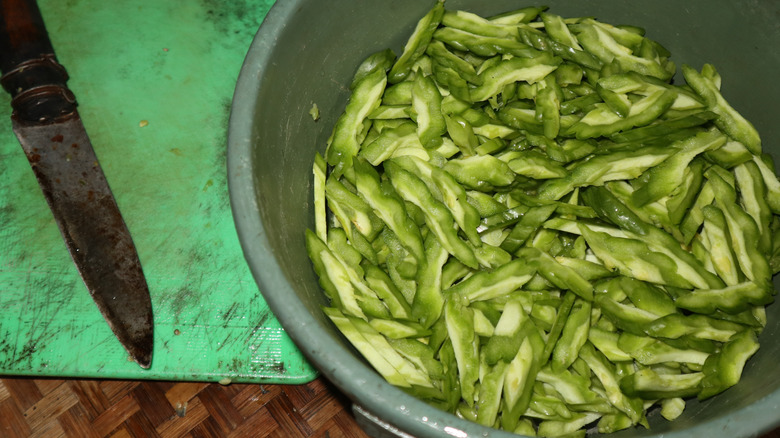An Underrated Vegetable That Can Prevent Cancer And Manage Blood Sugar Is Also One Of The Most Nutrient Dense Foods
If there's one food group most of us could stand to eat more of, it's vegetables. Packed with vitamins, minerals, and plant-based compounds, veggies are key to keeping your body running efficiently. They're also hard to beat when it comes to fiber, which supports gut health and helps you feel full longer. You probably already have your favorites like tomatoes, carrots, or potatoes, but some lesser-known veggies can pack even more nutrients into each serving.
Unless you're a fan of Asian cuisine, you might not have heard of bitter melon. Despite the name, bitter melon isn't actually a melon. It's a gourd, similar to zucchini or squash. Bitter melon is loaded with nutrients and naturally low in calories, making it one of the most nutrient-dense vegetables you can add to your plate.
One cup of bitter melon has only 16 calories but delivers 2.6 grams of fiber and 87% of your daily vitamin C. Vitamin C acts as a powerful antioxidant, helping your body fight off oxidative stress, which has been linked to cancer and other chronic diseases. Plus, this veggie has a low glycemic index, making it a smart choice for anyone keeping an eye on their blood sugar.
Bitter melon extract's effect on blood sugar and cancer
The low glycemic index of bitter melon isn't the only reason to give this vegetable a closer look. Bitter melon extract may work almost as well as the diabetes drug metformin when it comes to managing blood sugar, according to a 2011 study in the Journal of Ethnopharmacology. In the study, people with newly diagnosed diabetes who took 2 grams of bitter melon daily for four weeks saw similar improvements in blood sugar markers compared to those taking metformin. Researchers still aren't exactly sure how bitter melon helps lower blood sugar, but some believe it may help the body use sugar more effectively, reduce how much sugar is absorbed from food, or help the body produce more insulin.
Bitter melon extract also contains compounds that may help fight cancer. A 2020 review in Cancers found that the phenolic acids and flavonoids in bitter melon reduce inflammation and combat free radicals in the body. In addition, saponins and lectins may disrupt the growth of cancerous tumors, while specific proteins can trigger cancer cell death. Bitter melon also interferes with cancer by cutting off its energy supply. However, most anticancer research to date has focused on bitter melon extracts and laboratory experiments.
Other benefits of bitter melon
The nutrients in bitter melon may offer more than just blood sugar control and potential cancer-fighting benefits. This low-calorie, high-fiber veggie may also support weight loss, according to a 2015 review in the Journal of Lipids. Bitter melon might help your body store less fat and burn more fat for energy, especially if your diet tends to be high in fat. It may also help reduce harmful belly fat, which is linked to a higher risk of heart disease. Lab studies have also found that bitter melon can lower triglycerides and bad cholesterol.
As the name suggests, bitter melon has a naturally bitter taste when eaten raw. That bitterness gets even stronger as the fruit ripens. The good news is that cooking bitter melon helps tone down the bitterness, making it easier to enjoy its health benefits. When preparing bitter melon, slice it open and scoop out the seeds and the white pith inside, as this part tends to be the most bitter. Then, slice it into strips and blanch them for a minute in boiling water to mellow the flavor even more. Bitter melon pairs surprisingly well with rich foods like eggs. Try scrambling some together for an easy, tasty dish (per The Woks of Life).


